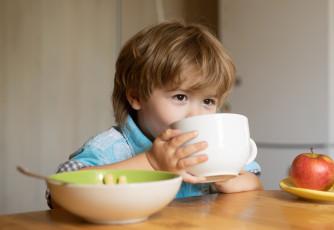
Nutrition
Fruits, vegetables and milk for the health of the child
It is no secret that children more often than not live by the things they have learnt during their childhood. That is also relevant when talking about establishing a healthy lifestyle. We here are sharing ideas, how to ignite the interest of children on this subject, try out new tastes and make sure there is knowledge about diet, that is full with vitamins.
In order for children to want to implement a healthy lifestyle in their life, not only the example of adults around them is important, but also it is necessary to explain these things in a language that children understand. It helps to do it comparatively and explain why one action is better than the other. Therefore, it is important to have conversations about why we need food at all, what is a healthy diet, what vitamins and foods people need in order for their body to grow and develop.
A conversation with children – why do we eat?
Uzsākot sarunu, skolotāja var jautāt, vai bērni zina, kāpēc vispār ēdam. Var runāt par katra bērna mīļākajiem ēdieniem. Sarunas turpinājumā var noskaidrot, vai bērni zina, kas ir veselīgs ēdiens. Sarunas noslēgumā skolotāja var aicināt bērnus veidot zīmējumus, kur redzami katra bērna mīļākie veselīgie ēdieni.
When starting a conversation, a teacher can ask, if the children know, why do we need food in general. You can talk about what are the favorite foods of each child. To continue the discussion, you can ask, if children know what is healthy eating. To conclude the conversation, the teacher can ask children to do drawings of their favorite healthy foods.
Let’s learn about greens!
When talking about food, another really important point of conversation is about how healthy it is to eat vegetables and fruits. However there is nothing as valuable as personal experience! How to get it? It is simple – do a vegetable and fruit tastings, where you try both traditional vegetables and fruits as well as something a bit more exotic!
What to get for the tasting?
- cucumber
- tomatoes in different colors
- radish
- cabbige
- carrot
- pea pods
- different peas
- asparagous
- broccoli
- fennel
- pea idling
- radish idling
- dill
- avocado
- cauliflower
- apples
- pear
- bilberry
- raspberry
- banana
- grapes
- mango
- pinapple
- kiwi
- hurma
When the products are prepared (washed, cut, put on plates or trays), you can ask children to come and taste them. Definitely highlight the foods that children haven’t tried or haven’t eaten in a long while. Maybe there are children who used to dislike some of these fruits or vegetables, but now their thoughts have changed. If some children don’t like something, definitely do not criticise them about that – praise them about at least trying them.
Let’s grow greens!
When talking about how important healthy eating, and to that extent – greens, are important to every child, it is a great moment to start growing your own greens on the windowsills. Every child can decide, what they want to grow – basilic, radish idling, pea idling, spinach, etc. You can create a whole afternoon out of it and also decorate the pots. In the next few weeks, every child is responsible for their own greens. When they are fully grown, they can be put on children’s lunch plates.
Milk for strength and endurance
Another important product is milk, because it contains calcium that is important for strong bones and teeth. When talking about this, you can create a Strength Afternoon.
During that afternoon children can do different sport related things – carry heavier and lighter objects from one side of the room to another and try to do it as quick as possible, throw balls at a target, do exercises that involve jumping and crawling, do relays.
After the sport exercises you can talk about how easy or hard that was and conclude that strength and endurance is necessary.
Milk and fruits for schools (and also pre-schools)
For years now in Latvian schools and pre-schools it is possible to register for a programme called “Milk and Fruits for school”. That means, that these educational institutions have the chance to offer fruits, vegetables and milk to their students for free.
At this moment it is only possible to register for milk, because the budget for vegetables and fruit was distributed at the start of the study year.
If the education institution registers for the programme in January (the deadline for registration is the 27th of January (it starts on the 15th)), they can start offering milk to their students starting from the 1st of February. For pre-schools the programme will end on the 31st of July.
At the start of autumn it will be possible to register also for fruits and vegetables.
Information about the programme: http://www.lad.gov.lv/lv/atbalsta-veidi/tirgus-pasakumi/tirgus-pasakumu-veidi/piens-un-augli-skolai-289.
The website of the programme: http://piensaugliskolai.lv

 Log In
Log In